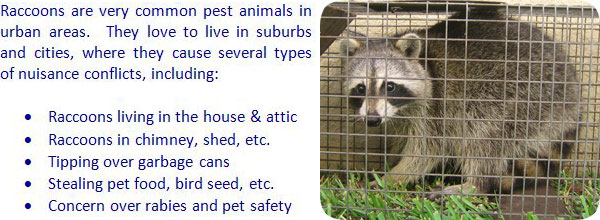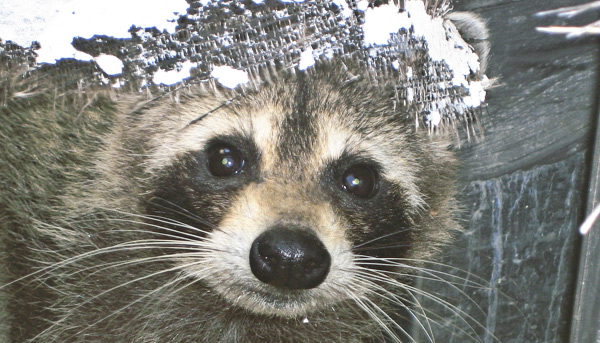- info@wildlifeanimalcontrol.com
Call us for help in your town
Wildlife Control Education
How to Keep Raccoons Away

Need raccoon removal in your hometown? We service over 500 USA locations! Click here to hire us in your town and check prices - updated for year 2020.

If you have a problem with the intelligent and
curious raccoon, then you’re in for a real
challenge. The fact that they look curious with
their black masked faces, hands that are slender
like humans and a nice size broad body, only
adds to their mystique. They can weigh up to 8
Kg while being 8 cm long and they have been
known to live up to five years while in the
wild. Yet the wild is not the only place that
these creatures seem to find some comfort. They
may find shelter in your home or somewhere in
your yard where food is plentiful. As cute as
they may be, they can cause real havoc in your
home and yard and many people turn to repellants
as a way to get rid of the animals. Though cute,
can be very destructive to property. Here are
some of the ways that you can prevent raccoons
from making a habitat of your home.

Lighting
Raccoons are known to be nocturnal animals and
hide under the cover of darkness when hunting
for food. Introducing lighting in your property
is a sure way of doing away with raccoons. One
or two floodlights in your compound and you will
prevent raccoons from lingering on your
property. Motion-activated lights are the best
way to deal with these stubborn animals as they
will scare them the moment they try to step into
your property.
Sound
Most nocturnal animals are so used to silence
that sound often scares them. Raccoons being
mostly nocturnal are also afraid of loud sound
and as a result, introducing a source of sound
in your property or compound is a sure way of
doing it. It may be impossible to shout every
time a raccoon appears, but a radio placed near
the spots that raccoons frequent is a sure way
of keeping them out of your property.
Using Repellants
For ages, human beings have been using common
household materials to rid their homes of
raccoons. Some of the common readily available
repellants include: human hair, mothballs,
ammonia and bleach. None of these repellants may
be irritating enough for a determined raccoon or
a mother on her nest, but they are still very
useful. However, ammonia, with its nasty smell
has been found to be very effective for keeping
your property free of raccoons.
Getting rid of their food supply
Raccoons are omnivores. Their diet is largely
compromised of nuts, insects, birds’ eggs and
worms. It goes without saying that an easy
source of food is one of the best factors that
will attract raccoons to your property. Since
they do not need to hunt the food already stored
in your property, raccoons may storm your
compound in large numbers if they remain
unchecked. However, if you cut off their food
supply, they will have no reason for attacking
your property. A good start would be to keep
your trash bins beyond their reach. Bird and pet
feeders are also an easy pick for raccoons and
so they should be kept clean.
Fencing
Fencing is an effective way of keeping your
property free of raccoons. However, many people
just erect the regular fences and hope that they
will keep the raccoons away. However, raccoons
are very canning and intelligent animals. As
such, they will just dig below the fences or
climb over them to get access to your compound.
However, an electric fence does not allow entry
of any unwanted animals into your property. If
you want an effective way of keeping raccoons
away from your property, you should try erecting
an electric fence. It doesn’t have to stay armed
all day since raccoons are most active at night
and that is when you need to arm the fence.
Go back to the How to
get rid of raccoons home page.
MORE KEEP AWAY RACCOON TACTICS:
Shake Away Coyote Urine
Shake away is supposed to be one of the
strongest repellants against raccoons that is
natural and safe to use. It uses the scent of
the coyote’s urine to repel them. A coyote is
one of the raccoon’s biggest predators making
their urine a beneficial repellant against them.
Coyote urine can be bought as a liquid, powder
or in capsule form. The liquid can be placed
inside of a plastic dispensing bottle that you
can hang from a tree in your yard. The scent is
supposed to stay potent for at least a month or
two. It is recommended though that you spray it
on your plants directly to keep them from being
eaten by other animals as well. The powder form
can be placed around the perimeter of your lawn,
while the capsules can be planted in the ground
for a repellant that last much longer. Capsules
can keep the raccoons away for up to 2 months.
The product is 100 % organic making it harmless
to animals, plants and people. It’s mess free
and it’s supposed to be guaranteed to work.
However, repellants are only temporary and need
to be refreshed after so many months.
Homemade Repellants
According to the humane society in Colorado, you
can mix one bottle of Cheyenne pepper, one
teaspoon of mild soap and a gallon of water, as
a mixture to spray around the landscaping of
your home, on your plants & vegetables, in
gardens and even in your garbage cans. The
problem with this repellant is that if it rains,
you’ll have to reapply it. If you have children
that regularly play outside or outside pets,
they could get a hold of it and get burned or
trigger allergies. Not to mention, it can burn
other animals as well. You also have to
continuously reapply this which only makes it
effective for a certain period of time.
Mothballs
Your grandmother just keeps ranting and raving
about how you should have used mothballs to keep
the raccoons away. While it may actually work,
using mothballs to repel raccoons is actually
dangerous and in some states illegal. The reason
being is that as mothballs sit out, they start
to vaporize. The chemicals that they contain are
released into the air and increase the chances
of nasal cancer and liver damage in humans. Not
to mention, it can cause other fatal health
problems to humans and animal life when
ingested. Even if you used them in your attic,
it is still harmful considering it can seep
through the cracks, floors and walls putting
everyone in the household in danger. Mothballs
by law are only registered to kill moths in
small airtight spaces.
Fences
A hardworking gardener may get tired of the
raccoon getting into his crops eating up all the
sweet corn and decide to install an electric
fence. These fences usually consist of at least
two threads of wire that delivers a shocking or
stinging feeling to the raccoon when he tries to
get in. Chicken wire, newspaper, vinyl
landscaping cloth or aluminum foil can also be
set around a garden or yard as an acting fence
or barrier to keep raccoons out. It is said that
these items present an irritating feeling to the
raccoon’s sensitive paws.
Is there really a repellant for raccoons that
gets rid of them for good and not just
temporarily, without you having to continuously
spend money? No, the only way to get rid of a
pesky raccoon and keep them away for good is to
call an expert who can remove and relocate them
for you.
More in-detail
how-to raccoon removal articles:
Information about raccoon
trapping - analysis and methods for how to
trap.
Information about how
to kill a raccoon - with poison or other
methods.
Information about how
to catch a raccoon - remove one stuck in
the house.
Information about raccoon
repellent - analysis of types and
effectiveness.
Learn about raccoon roundworm and what to do about a raccoon under the porch. Find out if raccoons live or sleep in trees and what equipment is needed to trap raccoons. I can let you know if it is legal to trap a raccoon and how to identify raccoon tracks. Find out if raccoons can swim, why they tear up sod, how smart they are, and if raccoons hibernate. Learn if raccoons can jump onto houses or over fences, and some of the symptoms of a sick raccoon. I can let you know if the city or county animal services will help with a raccoon issue, and what wildlife rehabilitators do with raccoons. Learn where you should relocate a trapped raccoon and how to keep raccoons out from under your porch.
This site is intended to provide raccoon
education and information about how to keep
raccoons away from your house, yard, garbage
cans, pool, so that you can make an informed
decision if you need to deal with a raccoon
problem. This site provides many raccoon control
articles and strategies, if you wish to attempt
to solve the problem yourself. If you are unable
to do so, which is likely with many cases of
raccoon removal, please go to the home page and
click the USA map, where I have wildlife removal
experts listed in over 500 cites and towns, who
can properly help you with your nuisance
raccoon.
Click here to read more about how
to get rid of raccoons.

















